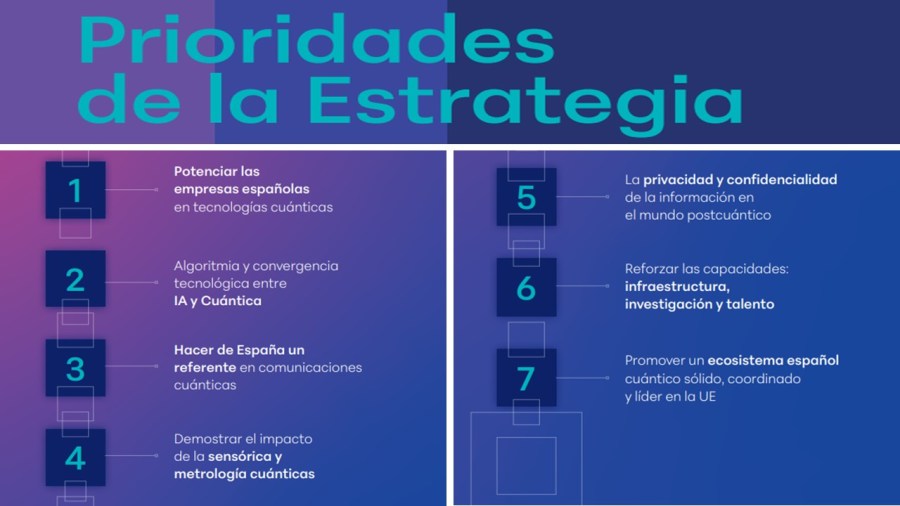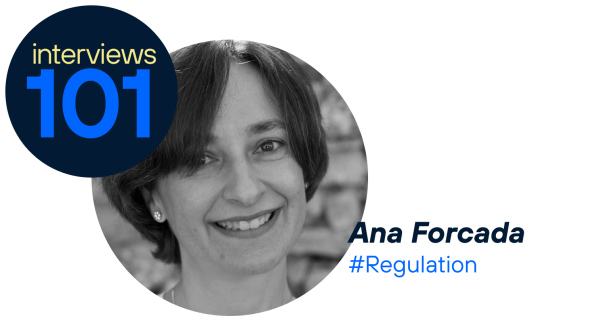This week, during the OECD Global Forum on Technology dedicated to Quantum and held at the Telefónica Foundation in Madrid, Spain unveiled its Quantum Strategy 2025–2030 — a comprehensive plan to foster the development of a strong national ecosystem for quantum technologies. Alongside Artificial Intelligence, 2025 is undoubtedly the year of quantum technology. Marking a pivotal moment for quantum innovation, the United Nations has declared it the International Year of Quantum Science and Technology (IYQ), an initiative that highlights the growing global significance of this transformative field.
Unlocking the value of quantum technologies across key sectors
In the vast, unruly landscape of emerging technologies, few areas spark as much anticipation — or uncertainty — as Quantum technologies. Long the preserve of theoretical physics departments, the technology is slowly inching toward commercial reality, promising radical advances. Its power lies in exploiting the peculiarities of quantum mechanics — such as superposition and entanglement—to perform calculations that are beyond the capabilities of today’s classical machines for certain types of algorithms.
Quantum technologies have a strategic impact across multiple key sectors, notably on secure communication infrastructures. Fields such as telecommunications, defence, healthcare or drug discovery, banking, climate simulation, critical infrastructure, and advanced materials benefit from quantum-enhanced security and computational power. Post-quantum cryptography is strategically important for addressing challenges such as the ‘store now, decrypt later’ threat. It secures financial transactions and protects critical sectors like utilities, while quantum modelling may drive breakthroughs in biotechnology and the development of energy-efficient materials. Connected and autonomous vehicles require robust communication security to prevent hacking and protect privacy, and large data centres must adopt quantum-safe communication and storage solutions to safeguard massive volumes of sensitive data. In healthcare, the long-term protection of sensitive medical information is essential, and the combination of AI with quantum computing and sensing could transform diagnostics and treatment.
These advancements are essential not only to maintain global competitiveness but also to ensure long-term resilience. Promoting the early adoption —including within public administrations— of quantum technologies will unlock innovation, enhance security, and reinforce industrial leadership in a rapidly evolving technological landscape.
A Spanish National Strategy with European and Global Ambition
The Spanish strategy, aligned with broader European efforts aims to establish the country as a competitive hub for quantum research, infrastructure, and applications.
The strategy outlines several priorities to position the country at the forefront of the global quantum race. With an initial public investment of €808 million and an ambition to attract an additional €700 million from private sources, the strategy outlines a comprehensive roadmap—from fundamental research to industrial applications.
It emphasizes talent development, infrastructure enhancement, and public-private collaboration, while introducing initiatives like the Felisa Martín Bravo Prize to celebrate emerging talent. This holistic approach reflects a clear understanding of quantum technologies not just as a scientific frontier, but as a critical pillar for future sovereignty, security, and competitiveness across key sectors such as communications, healthcare, defense, energy, and cryptography.

However, the real test for this strategy will be its ability to address structural challenges that have historically hindered Europe’s leadership in deep tech, such as fragmented initiatives, limited private investment, and weak coordination.
Projects like Quantum Spain, which led to the deployment of the first quantum computer with 100% European technology at the Barcelona Supercomputing Center, demonstrate Spain’s growing capabilities. But sustained success will require a coherent and unified national effort to avoid duplications and ensure scale. Spain’s quantum bet is a strategic investment in its future relevance—yet its transformative potential will only be realized through consistent execution, long-term commitment, and agile governance.
OECD: Building an international collaborative and inclusive quantum ecosystem
At the Tech Forum in Madrid on April 24, quantum technologies were a focal point—highlighted not only as a transformative opportunity but also as a complex policy challenge. The OECD, working closely with member states and stakeholders, presented a compelling vision: the world must build a collaborative, inclusive, and strategically aligned quantum ecosystem to harness this emerging field’s full potential. This includes coordinated national strategies, standardisation, long-term public investment, and cross-border cooperation to prevent fragmentation in a domain where both risks and opportunities are undeniably global.
The OECD’s policy recommendations are clear. Governments are urged to invest steadily in quantum research and infrastructure while fostering a deep, interdisciplinary talent pool. Robust regulatory frameworks are needed to anticipate security, ethical, and technological challenges. Crucially, the OECD underscores the importance of grounding quantum development in democratic, human-centric values, ensuring the technology enhances societal well-being rather than outpacing it.
Spain’s unveiled National Quantum Technologies Strategy reflects these priorities and aligns closely with the broader European ambition to reduce reliance on foreign technologies and narrow the innovation gap. The message from Madrid: momentum is building, but success will depend on translating strategic vision into tangible leadership.
How private sector is adapting to this new age and Telefónica’s strategic role in advancing and implementing quantum technologies
As quantum technologies transition from labs to real-world applications, the private sector is beginning to adapt to this fast-emerging landscape. Companies are exploring how quantum breakthroughs could reshape business models, disrupt legacy systems, and unlock new competitive advantages. At the same time, global collaboration and the development of common standards are becoming critical to ensure interoperability, scale infrastructure investments, and prepare a new generation of quantum professionals through specialised training.
Telefónica has launched its Centre of Excellence for Quantum Technologies, announced during the Mobile World Congress in Barcelona. This initiative consolidates the company’s efforts across three strategic areas: quantum communications and cybersecurity, quantum computing and simulation, and quantum sensors and metrology.
During the workshop, several notable examples were highlighted, including Telefónica’s pre-commercial Quantum Communications Network (TEFQCI), set in Madrid, which supports European research projects in collaboration with manufacturers, research centers, and telecom operators, and contributes to initiatives like EuroQCI-Spain. Another key example is the Quantum-Safe eSIM, a quantum-resistant cryptographic solution tailored for IoT devices, particularly smart meters for gas, electricity, and water. Additionally, the BIQAIN Quantum Hub was discussed, which fosters the development of a quantum innovation ecosystem by bringing together universities, startups, and other key stakeholders.
A key focus is Telefónica’s crypto-agility strategy, which allows it to adapt cryptographic protocols quickly in response to future quantum threats—reinforcing network security for both the company and its customers. In areas like quantum communications, where the promise of ultra-secure, quantum-resilient networks is rapidly gaining momentum, Telefónica is at the forefront of innovation and international collaboration. As highlighted at the OECD forum, building collaborative governance frameworks will be essential to ensure quantum technology advances in ways that enhance trust and security.
A pragmatic bet on the future
Spain’s decision to elevate quantum technology within its national agenda is both timely and pragmatic. The country has already shown strengths. Whether it can convert these into meaningful influence on the global stage remains uncertain.
What is clear is that in the years ahead, those countries investing early, forging open alliances, and helping shape the standards of this new field will be the ones defining its future. Quantum, once confined to the chalkboards of physicists, is fast becoming a matter of national strategy — and Spain is intent on having a seat at the table.











